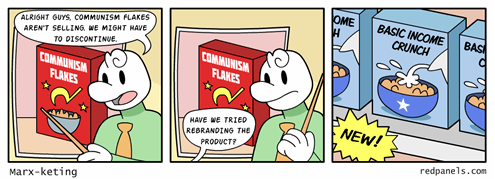 The push for a government dispensed form of ‘universal basic income’ seems to be gathering more unwholesome steam by the day. I even had a commenter mandating for it here the other day. As a result I feel compelled to weigh in on the subject and discuss not just its underlying flaws but the giant deceit that cloaks the entire disgusting edifice.
The push for a government dispensed form of ‘universal basic income’ seems to be gathering more unwholesome steam by the day. I even had a commenter mandating for it here the other day. As a result I feel compelled to weigh in on the subject and discuss not just its underlying flaws but the giant deceit that cloaks the entire disgusting edifice.
As the above cartoon demonstrates, universal basic income is just another attempt to sell us communism in another name. But in order to demonstrate how it will inevitably morph into yet another version of socialism that “just hasn’t been implemented properly”, we need to examine what the consequences of just such a scheme would be on the ordinary individual and to society at large.
The drive for a UBI comes from the scaremongering associated with the implied threat that the majority of us will lose our jobs in the future to robots. This is the same threat that socialists have been making since the 1870s. Back then everyone was going to lose their jobs to those pesky machines of the industrial revolution, and today everyone is going to lose their jobs to the … well, to those pesky machines of the technology revolution.
The sugar that is being used to coat basic income crunches to make them palatable seem reasonable at first glance. Which is always the way with sweet temptations. The claim is being made that a UBI will reduce bureaucratic costs by rolling all different types of welfare into one single scheme. The big catch-phrase of the moment is ‘reducing complexity’. Before you begin jumping for joy, please understand that public servants will never voluntarily introduce a scheme that could then see them losing their own jobs to its supposed efficiencies. The bureaucracy never seeks to diminish itself.
And it is very easy for proponents of a UBI to toss out such platitudes without any numbers to back them up. Thankfully, someone on our side of the fence has made an in-depth study. Professor David Henderson has a wonderful paper titled, A philosophical economist’s case against a government-guaranteed basic income.
“The annual BIG expenditure for U.S. citizens, then, would be approximately $2.068 trillion. This expenditure estimate does not include any expenditure for administering the program or for monitoring for fraud. In other words, it is a minimum estimate.
“… Assume, as Zwolinski advocates, that such a program would displace all 126 federal antipoverty programs and all state and local government antipoverty programs. … Notice what would happen. A $2.068 trillion program would replace programs whose total expenditures in 2012 were $952 billion. Even rounding up the $952 billion to $1 trillion, the program that Zwolinski advocates is more than twice as costly in budgetary terms as current antipoverty programs. … How would Zwolinski fund this major increase in federal spending? … he would need to have the federal government increase taxes from their estimated $2.993 trillion to $4.361 trillion, an increase of 45.7 percent.”
Those sneaky public servant managers – always out to increase the size of their underlings and thus give themselves more power. Not to mention the tax grab. Isn’t that extraordinary. And thus we come to the next problem with the UBI; government largesse. Or to be more accurate, taxpayer largesse at government gunpoint.
Professor Henderson has this covered as well.
“…there is another major problem: the “public-choice” problem. …those who advocate further government programs…must show that there is a high probability that such government programs will not grow further. …in the case of a BIG, they must show that there is a high probability that a scaled-down BIG really would replace all of the existing programs for the poor and near poor. This is hard to do because the various interest groups that favor the existing programs will not sit back: they will fight to keep some or all of those programs. Zwolinski…writes that if the BIG “were implemented via a constitutional amendment, many of the public choice considerations could be reduced, I think, to an acceptable level.”11 Yet, as Randy Barnett (2004) and Robert Levy and William Mellor (2008) show, even strict constitutional limits on federal government power have yielded to the U.S. president, Congress, and the courts.”
For those of you who doubt this, just consider that personal income tax was a temporary emergency measure brought in by western governments to help fund the Great War.
This scheme would steadily erode the taxpayer base, shrinking it ever further as more and more businesses elect to move their operations to other less restrictive nations. One can see this in action in the present day with the events in Venezuela. And of course, there aren’t too many private businesses in North Korea, a country that has to beg for international aid to feed its worker slaves while it spends what little money it has on nuclear weapons.
The other major flaw, and potentially the aspect of the UBI that would have the most devastating consequences would be the effect that it would have on the individual. Work gives people dignity by giving them personal power. Under a UBI people would become chattels of the state, and it would only take a couple of generations for memories to fade and for such a situation to become the norm, much as what happened with those temporary personal income taxes.
Being a state chattel means a complete loss of hope, as well as personal power. Just ask anyone who lived behind the Iron Curtain. Pretty soon there would be no need to send the majority of the children of the underclass to school. What would be the point if your future is a guaranteed basic income? The only thing that it would guarantee would be the total servitude of the majority of the population. If your only income is dependent on your relationship with the state then you better not step a foot out of line. That guaranteed basic income will be the only thing between you and guaranteed starvation.
Power and subservience. The two feed off each other. Without one there cannot be the other. A universal basic income would give great power to unelected bureaucrats and others fortunate enough to find themselves in the right seat at the right time. These individuals would do their utmost to ensure that their own power would pass to their progeny, which is exactly what happened in every major socialist state.
Socialism at heart is a return to feudalism, but without the pomp and ceremony. And those pushing for it, in whatever form that it takes, are always keenly aware that they must ensure that they end up on the correct side of the fence. The side with power.
The side that has a job.
Thanks to Dam Mitchell’s essay on this topic for various links.
This article was originally published at https://pushingrubberdownhill.com/, where Adam Piggott publishes regularly and brilliantly. You can purchase Adam’s books here.










